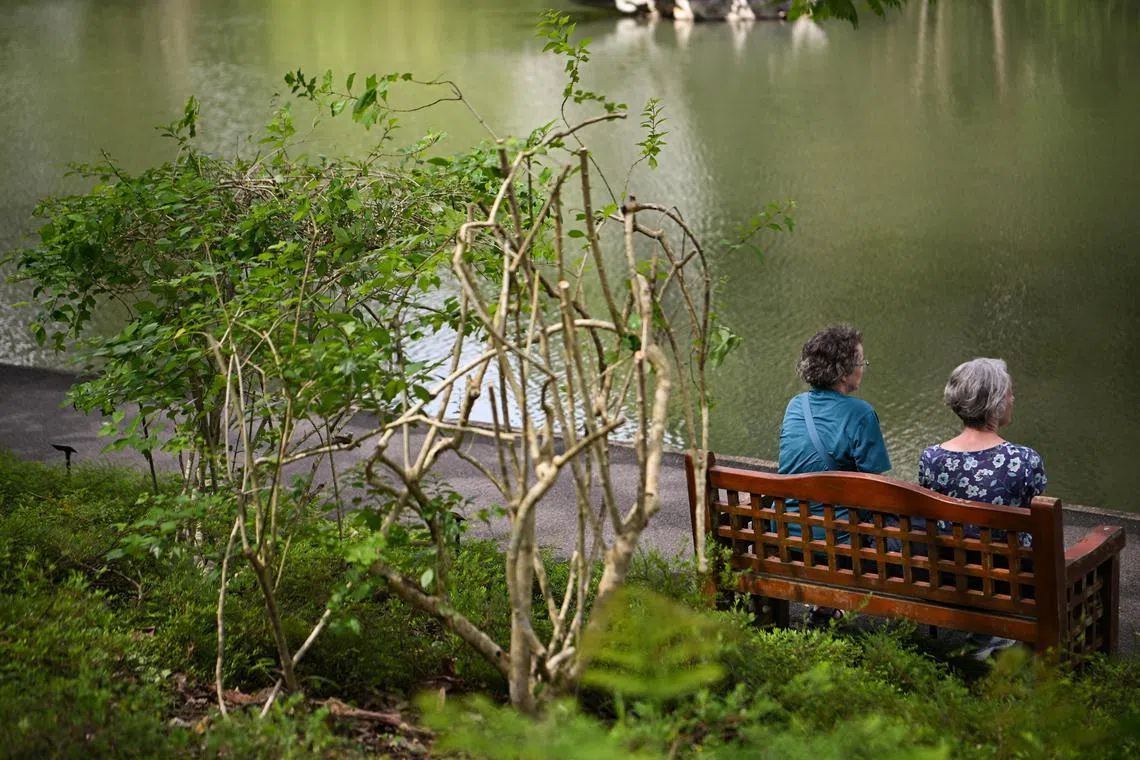Paid companionship for the lonely elderly: Taboo or growing need?
Sign up now: Get ST's newsletters delivered to your inbox

Homage's Esther Joy Mark has more than three years’ experience in providing companionship to the elderly.
ST PHOTO: EUGENE TAN
SINGAPORE – Walks in the park, grocery shopping, simple exercises and massages, and playing mind-stimulating games like jigsaw puzzles – Ms Esther Joy Mark has done all of these and more with her elderly clients, to keep them active and engaged.
The 28-year-old, from care services provider Homage, has more than three years’ experience in providing companionship to the elderly. She is also a full-time supply operations associate with Homage.
Ms Mark, a former legal secretary, said she has always connected well with the elderly. She has also forged friendships with some regular clients, including an elderly cancer patient who died a few months after they ‘”clicked”.
“I was on my way to keep her company when the husband called to say she had just passed away, but I went to her home to pay my last respects to her anyway,” she recalled.
She gets eight to 10 assignments monthly. Some require her to help with activities of daily living like going to the toilet or feeding, on top of the usual companionship. Others get her to perform household chores like mopping and vacuuming while she chit-chats with them.
“Demand is on the rise, and many next-of-kin may not have the time, strength or energy to assist with tasks like proper lifting and safe transferring from the bed to wheelchair,” she said, adding that she has received basic caregiver training.
Her earnings start from $17 per hour. Clients are charged from $21 per hour.
Ms Gillian Tee, chief executive officer and co-founder of Homage, said with Singapore’s ageing population, Homage has seen a growing loneliness epidemic as a result of older adults living alone or being restricted to the same environment due to age-related illnesses or lower mobility.
“Across the markets we operate in – Singapore, Malaysia and Australia – we continue to see many instances of the elderly experiencing isolation, loneliness and boredom, which as a social determinant of health can be instrumental to their physical and mental well-being,” she said.
Singapore became an aged society in 2017, and is set to attain “super-aged” status in 2026. According to the United Nations, a country is super-aged when 21 per cent of its population are aged 65 and older. By 2030, one in four citizens here will be aged 65 and above, up from one in six now.
“The aim of befrienders is to ensure seniors are exposed to frequent social interactions, and provide psycho-emotional support,” said Ms Tee. “It also serves as an opportunity for befrienders to spot areas for improvement in a senior’s daily living environment, such as addressing any fall risks.”
Ms Mark said that besides being a physically demanding job, a befriender needs much patience and empathy.
“Some clients can be abusive and uncooperative, as they are not used to having strangers enter their personal space or are not feeling well,” she said. “If necessary, I will call the next-of-kin for help.”

Paid companionship for the elderly can help combat loneliness and offer some respite to caregivers.
PHOTO: ST FILE
Another company in this space is Coddle, which has provided home care services since 2017. It has over 90 “coddlers” aged 18 to 75.
Its companionship services include playing board games, visiting places of interest, or even doubling up as medical escorts. It provides about 1,800 hours of companionship service every month.
Mr Robin Tan, director of Coddle, said there are more inquiries than bookings, as many still feel that parental care is part and parcel of filial piety. “They feel that if family or friends know that they outsource this to strangers, they will start to talk,” he said.
However, what many do not realise is that people today juggle many roles and have limited time, he added.
“They do set aside family time but it may not be enough for their parents,” he said. “Caregivers also need some respite, such as saving up some leave for a family vacation.”

Ms Esther Joy Mark said she has always connected well with the elderly. She has also forged friendships with some regular clients.
ST PHOTO: EUGENE TAN
Apart from paid companionship, in Singapore there are also elderly befriending services, senior activity groups and group exercise programmes, such as those offered by Reach Community Services, Lions Befrienders and Touch Community Services.
Singapore University of Social Sciences law lecturer Ben Chester Cheong said it is important that paid companionship providers screen potential candidates through in-depth interviews and background checks.
This is to ensure that services are conducted in a safe, respectful and ethical manner, he said, as the elderly clients could face the threat of violence or harm.
Referring to a World Bank report released in 2015, he said that the tradition of relying on family support in old age is eroding in a number of countries.
For example, in South Korea, less than 30 per cent of older people live with their children. In China, 43 per cent of those aged 65 to 70 live with their children, down from two-thirds in the early 1980s.
In Singapore, seniors aged 65 and over living with their spouses and without children increased from 19.4 per cent a decade ago to 26.5 per cent in 2020. Seniors living alone accounted for 10.2 per cent in 2020, an increase from 8.2 per cent in 2010, according to the Singapore Department of Statistics.
“While East Asian societies are known for a tradition of Confucian filial piety, it is also true that many are experiencing a rapidly ageing population,” Mr Cheong said.
“Paid companionship could be one way of reimagining traditional notions of filial piety, especially if it helps to improve the mental well-being of the elderly.”


